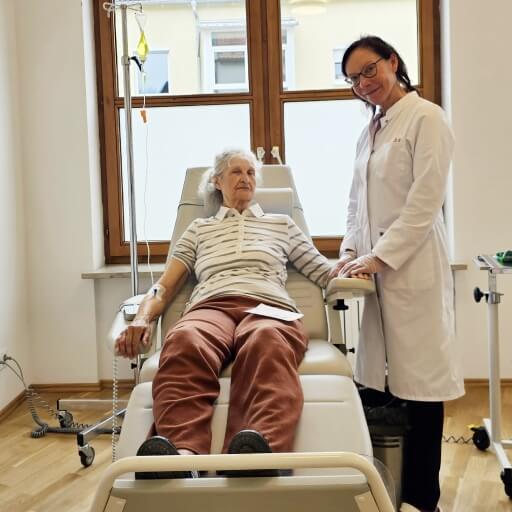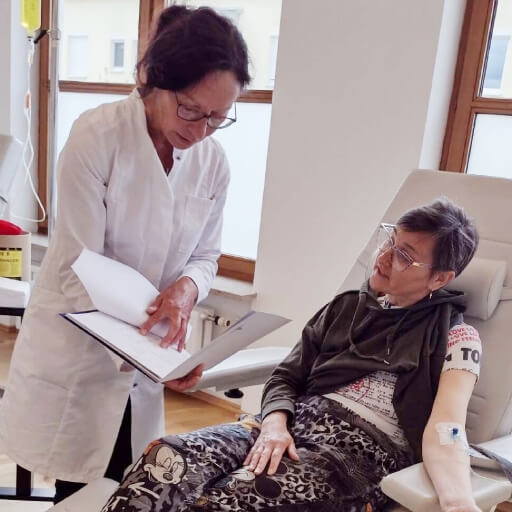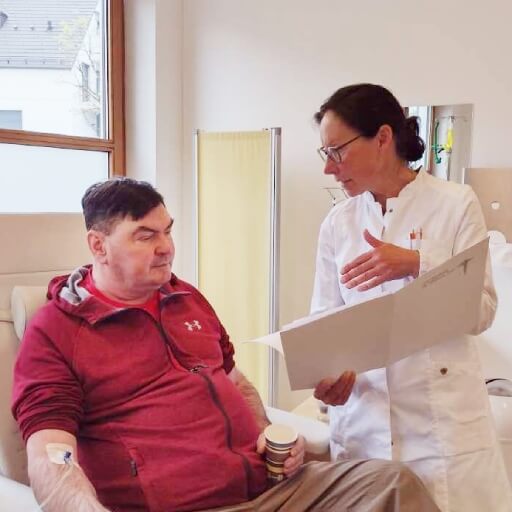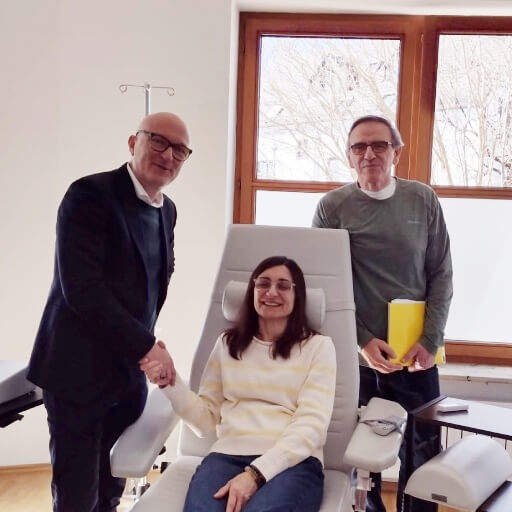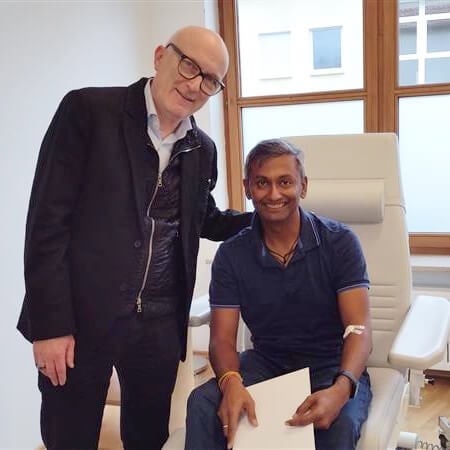يُعدّ سرطان البنكرياس أحد أكثر أشكال سرطان الجهاز الهضمي عدوانية وفتكاً، وغالباً ما يتم تشخيصه في مرحلة متقدمة. في عام 2022 وحده، كان مسؤولاً عن ما يقرب من 467.000 حالة وفاة حول العالم، مما يجعله السبب الرئيسي السادس للوفيات المرتبطة بالسرطان على مستوى العالم.
معدل البقاء على قيد الحياة لمدة 5 سنوات الإجمالي لسرطان البنكرياس لا يزال منخفضاً، حيث يبلغ حوالي 13٪. بالنسبة للحالات التي يتم تشخيصها في مرحلة موضعية، يتحسن معدل البقاء على قيد الحياة لمدة 5 سنوات إلى حوالي 44٪. ومع ذلك، في كثير من الحالات، لا يتم اكتشاف المرض إلا بعد انتشاره، مما يحد بشكلٍ كبير من خيارات العلاج ويُقلل معدل البقاء على قيد الحياة لمدة خمس سنوات إلى حوالي 3٪.
على الرغم من هذه الإحصائيات، هناك شعور متزايد بالأمل. أدى التقدم في مجال البحث الطبي إلى تطوير أدوات تشخيصية وطرق علاج مبتكرة، مما يوفر إمكانية التدخل المبكر وتحسين النتائج.
علاوةً على ذلك، يركز المجتمع الطبي بشكل متزايد على أساليب العلاج الشخصية، بما في ذلك العلاجات المُستهدِفة والعلاجات المناعية، والتي تهدف إلى تعزيز فعالية العلاجات الموجودة وتحسين جودة حياة المريض.
مع الأبحاث المستمرة، وتقنيات التشخيص المُحسنة، والالتزام بالكشف المبكر، يتطور مشهد علاج سرطان البنكرياس تدريجياً. يتم تشجيع المرضى وأسرهم على استكشاف خيارات العلاج الأكثر فعالية المتاحة.
العلاجات التقليدية لسرطان البنكرياس: ما هو متاح حالياً
يعتمد نهج العلاج التقليدي لسرطان البنكرياس إلى حدٍ كبير على مرحلة الورم وموقعه، حيث تُشكل الجراحة، والعلاج الكيميائي، والعلاج الإشعاعي جوهر الرعاية.
الجراحة هي الخيار المفضل للمرضى الذين تقتصر الأورام لديهم على البنكرياس وتُعتبر قابلة للجراحة. الإجراء الجراحي الأكثر شيوعاً هو عملية ويبل Whipple operation، والتي تتضمن إزالة رأس البنكرياس جنباً الى جنب مع الهياكل القريبة مثل أجزاء من المعدة، والأمعاء الدقيقة، والقنوات الصفراوية، والمرارة. على الرغم من أن هذا الإجراء معقد ويتطلب جهداً كبيراً، إلا أنه يوفر أفضل فرصة طويلة الأمد للبقاء على قيد الحياة للمرضى المؤهلين.
العلاج الكيميائي يُستخدم عادةً كعلاج أولي للمرحلة 3 من سرطان البنكرياس، خاصةً عندما يُعتبر الورم غير قابل للجراحة أو انتشر إلى هياكل مجاورة. يلعب دوراً محورياً في إبطاء تقدُم المرض، وتقليل حجم الورم، وإدارة الأعراض. يُستخدم هذا النهج أيضاً على نطاق واسع في المرحلة الرابعة من سرطان البنكرياس، حيث يساعد في إدارة المرض النقيلي عن طريق السيطرة على نمو الورم وتحسين جودة الحياة. رغم أنه قد يطيل فترة البقاء على قيد الحياة في كلتا المرحلتين، إلا أن معدلات الاستجابة غالباً ما تكون محدودة، وقد يتعرض المرضى لآثار جانبية كبيرة تؤثر على صحتهم العامة.
العلاج الإشعاعي غالباً ما يتم استخدامه كعلاج داعم، إما بمفرده أو بالاشتراك مع العلاج الكيميائي. قد يساعد في تخفيف الألم، أو تقليص الأورام في مواقع محددة، أو تقليل خطر التكرار الموضعي للمرض. ومع ذلك، كما هو الحال مع العلاج الكيميائي، فإن الفائدة الإجمالية من حيث البقاء على قيد الحياة على المدى الطويل متواضعة.
على الرغم من أفضل الجهود المبذولة في العلاجات التقليدية، فإن العديد من مرضى سرطان البنكرياس يواجهون معدلات تكرار عالية ونتائج محدودة للبقاء على قيد الحياة، وخاصةً عندما يتم تشخيص المرض في مرحلة متقدمة. ويؤكد هذا الواقع الحاجة المتزايدة لاستراتيجيات علاجية أكثر فعالية وتخصيصاً.
العلاجات المبتكرة لسرطان البنكرياس
غالباً ما تكافح العلاجات التقليدية لسرطان البنكرياس لتوفير فوائد البقاء على قيد الحياة على المدى الطويل، خاصةً في المراحل المتقدمة حيث حدثت النقائل (الانبثاثات) بالفعل. ومع ذلك، فإن المشهد يتغير بفضل الطفرات في العلاج المناعي، وطب الأورام الدقيق، والعلاجات الموضعية. لا تركز علاجات سرطان البنكرياس الجديدة هذه على تقليص الأورام فحسب، بل تركز أيضاً على تحسين قدرة الجسم على مكافحة السرطان أو استهداف الأورام بشكل أكثر فعالية مع آثار جانبية أقل. اثنان من الابتكارات الواعدة اليوم هما العلاج بالخلايا المتغصنة والانصمام الكيميائي (TACE)، وكلاهما يساعد المرضى الذين لديهم خيارات محدودة.
العلاج بالخلايا المتغصنة لسرطان البنكرياس
العلاج بالخلايا المتغصنة أحد أكثر أشكال العلاج المناعي تقدُماً في طب الأورام، حيث يوفر أملاً جديداً للمرضى الذين يعانون من سرطان البنكرياس المتقدم. تم الاعتراف بهذا النهج المبتكر بـ جائزة نوبل في علم وظائف الأعضاء أو الطب عام 2011، ويعمل من خلال استخدام جهاز المناعة الخاص بالجسم، وتحديداً الخلايا المتغصنة، المسؤولة عن تحديد التهديدات وتنشيط الخلايا التائية T cells التي تكافح السرطان. في هذا العلاج، يتم جمع الخلايا المتغصنة الخاصة بالمريض، وتدريبها في المختبر للتعرف على علامات السرطان المحددة، ثم إعادة حقنها في الجسم لإطلاق استجابة مناعية مُستهدِفة ضد خلايا ورم البنكرياس. أظهرت الدراسات السريرية وحالات من الحياة الواقعية أن العلاج بالخلايا المتغصنة يمكن أن يؤدي إلى تراجع الورم، وإبطاء تقدُم المرض، وتحسين جودة الحياة، كل ذلك مع آثار جانبية طفيفة، مما يجعله مناسباً حتى للمرضى الضعفاء أو المسنين. ولكي نفهم بشكلٍ أفضل كيفية عمل هذا العلاج وإمكاناته لتحقيق هدأة طويلة الأمد، نوصي بمشاهدة المقابلة مع البروفيسور فرانك جانسوج، وهو أحد أبرز أخصائيي المناعة في ألمانيا، والذي يشرح العلم وراء الخلايا المتغصنة ويشارك قصص نجاح من تجاربه السريرية.
"كل مريض يستحق نهجاً فردياً": مقابلة مع أخصائي المناعة الألماني الشهير البروفيسور جانسوج
الأشعة التداخلية لسرطان البنكرياس
تكتسب التدخلات الموجهة بالصور طفيفة التوغل مثل الاجتثاث عن طريق الجلد والانصمام عبر الشرايين زخماً في إدارة سرطان البنكرياس، وخاصةً في المرضى الذين يعانون من مرحلة متقدمة أو غير قابلة للاستئصال. تُمكن هذه التقنيات من القضاء على أنسجة الورم بشكل مُستهدِف مع تقليل إصابة الهياكل المحيطة. يتم تعزيز الدقة من خلال التوجيه في الوقت الحقيقي باستخدام التصوير بالموجات فوق الصوتية والتصوير المقطعي المحوسب (CT).
الاجتثاث الحراري، بما في ذلك الاجتثاث بالترددات الراديوية (RFA) والاجتثاث بالميكروويف (MWA)، يتم استكشافهم في علاج سرطان البنكرياس الغدي المتقدم موضعياً. تعمل هذه الطرق عن طريق تطبيق الحرارة الشديدة مباشرةً لتحفيز تدمير الورم. على الرغم من عدم تضمينه بعد في بروتوكولات الرعاية القياسية، إلا أن الاجتثاث الحراري يُظهر نتائج واعدة في حالات مختارة. أظهرت البيانات الاستباقية الأخيرة معدلات سيطرة موضعية واستجابة إشعاعية بنسبة 60-75٪ بعد 6 إلى 12 شهراً من الملاحظات. علاوةً على ذلك، من المعروف أن الاجتثاث الحراري يُحسن السيطرة على أعراض المرض، بما في ذلك تقليل الألم، مما يجعله خياراً مفضلاً في الإدارة الشاملة لسرطان البنكرياس.
الاجتثاث بالتبريد، الذي يستخدم درجات حرارة تحت الصفر لتدمير الخلايا الخبيثة عن طريق تكوين بلورات ثلجية، معروف أنه فعال في التعامل مع أورام البنكرياس المتقدمة موضعياً. وهو مفيد بشكلٍ خاص عندما تكون الآفات قريبة من الهياكل الحرجة مثل الوريد البابي. في حين أن الأبحاث لا تزال جارية، فقد أظهرت الدراسات التجريبية بقاء على قيد الحياة بدون تَقدُم بنسبة 66٪ تقريباً خلال 6 أشهر لدى المرضى الذين يعانون من مراحل متقدمة موضعياً من المرض بعد الاجتثاث بالتبريد. علاوةً على ذلك، يتم إدارة الاجتثاث بالتبريد في حالات سرطان القناة البنكرياسية النقيلي أو الأورام القابلة للاستئصال عندما يكون المريض غير راغب أو غير قادر على الخضوع للجراحة. يرتبط الاجتثاث بالتبريد بالحد الأدنى من المضاعفات المحيطة بالجراحة وعدد قليل من الآثار الجانبية مثل الألم أو عسر الهضم، مما يجعله بمثابة مسألة اختيار بين مختلف التقنيات المبتكرة.
العلاج الكيميائي الكهربائي (ECT) لسرطان البنكرياس هو تقنية علاجية تُحسّن امتصاص الأدوية الكيميائية العلاجية من خلال التأثير الناتج عن التيار الكهربائي. يجري حالياً تقييم هذه التقنية لعلاج أورام البنكرياس المقاومة للعلاج الكيميائي أو التي يصعب الوصول إليها جراحياً. ورغم أنها لا تزال قيد البحث والدراسة في هذا المجال، إلا أن التجارب السريرية المبكرة تُشير إلى معدلات استجابة في أورام البنكرياس تصل إلى 65٪، لا سيما في حالات الآفات الخبيثة القابلة للاستئصال بدرجة حدّية أو المتكررة التي تنطوي على توعية دموية عالية. إضافةً إلى ذلك، يُحفّز العلاج الكيميائي الكهربائي Electro-chemotherapy تأثيراً مناعياً علاجياً، مما يُوفّر ميزة محتملة عند دمجه مع العلاج المناعي في حالات سرطان البنكرياس المتقدم.
يستخدم العلاج الكيميائي الكهربائي ECT أقطاباً إبرية توضع على مسافة 2.5-3 سنتيمترات، مما يُنشئ مجالات جهد كهربائي يتم تنسيقها بواسطة مولدات نبضات يتم التحكم فيها بواسطة الحاسوب ومتزامنة مع تخطيط كهربية القلب للمريض. يتضمن البروتوكول العلاجي جلستين يفصل بينهما فاصل زمني مدته ثلاثة أسابيع للتقييم والمتابعة. عند النظر في تكلفة العلاج الكيميائي الكهربائي Electrochemotherapy، يجب على المرضى الأخذ في الاعتبار أن تكلفة العلاج الكيميائي الكهربائي تختلف باختلاف المؤسسة الطبية والموقع الجغرافي. يجري تقييم هذه الطريقة العلاجية لما لها من إمكانات محتملة في تجنب الجراحة الموسعة وتحقيق سيطرة على المرض في الحالات المقاومة للعلاج.
البروفيسور كوفاتش: كيف أصبح العلاج الكيميائي الكهربائي المعيار الذهبي للأورام التي يصعب الوصول إليها
الانصمام الكيميائي عبر الشرايين (TACE) هو علاج جديد لسرطان البنكرياس متقدم، وهو فعال بشكل خاص في علاج الأورام غير القابلة للجراحة أو تلك التي انتشرت إلى الكبد أو الرئتين. على عكس العلاج الكيميائي التقليدي الذي ينتشر في جميع أنحاء الجسم، فإن TACE يوصل العلاج مباشرةً إلى الشريان المُغذي للورم بينما يعمل في نفس الوقت على منع تدفق الدم، مما يُزيد من تركيز الدواء في موقع الورم ويحرم خلايا السرطان من الأكسجين والمُغذيات. يساعد هذا النهج المُستهدِف على تقليص الأورام، وإطالة البقاء على قيد الحياة، وتحسين راحة المريض مع آثار جانبية جهازية أقل. غالباً ما يتم استخدامه كجزء من خطة طب الأورام الأوسع، ويمكن دمجه مع علاجات أخرى، مثل العلاج المناعي، للحصول على مسار علاج أكثر تخصيصاً وفعالية. للحصول على شرح شامل لكيفية عمل TACE في أماكن سريرية حقيقية، نوصي بشدة بمشاهدة المقابلة مع البروفيسور أتيلا كوفاتش، الذي يشارك خبرته الواسعة ويلقي الضوء على لماذا أصبحت هذه الطريقة أساسية في إدارة وعلاج سرطان البنكرياس المتقدم.
البروفيسور كوفاتش: لماذا ضاعفت تقنية TACE معدل البقاء على قيد الحياة لمرضى السرطان – ما يحتاج المرضى إلى معرفته
العلاج الكيميائي الإقليمي لسرطان البنكرياس – التروية المعزولة للجزء العلوي من البطن – يقوم بتوصيل جرعات هائلة من العلاج الكيميائي إلى الورم (كما هو موضح في الرسم التوضيحي أدناه). يقوم الجراحون بإدخال قسطرات بالونية متخصصة عبر أوعية الفخذين ووضعها بعناية في الشريان الأبهر والوريد الأجوف أسفل الحجاب الحاجز. بعد ذلك، تُنفَخ البالونات، مما يؤدي إلى حجب تدفق الدم مؤقتاً، بينما تغمر الأدوية المركزة الجزء العلوي من البطن فقط لمدة دقيقة واحدة. ثم يتم تغيير موضع البالون العلوي، مما يخلق عزلاً تاماً يضمن نجاح العلاج الكيميائي الإقليمي للبنكرياس. خمس دقائق من التعرض الدوائي المكثّف لمنطقة الورم.
وهنا يكمن الفرق الحاسم مع العلاج الكيميائي الإقليمي لسرطان البنكرياس – إذ يتبع العلاج مباشرةً الترشيح الكيميائي Chemofiltration. حيث يقوم نظام الترشيح بتنقية الدم لمدة 45 دقيقة، مُزيلًا ما تبقى من الأدوية قبل أن تصل إلى الدورة الدموية العامة. غالباً ما يلاحظ المرضى تغير لون المخلفات المُرشحة إلى ألوان زاهية تبعاً لنوع عوامل العلاج المستخدمة في العلاج الكيميائي الإقليمي لسرطان البنكرياس. توضح هذه الخطوة الخاصة بتنقية الدم سبب بقاء الآثار الجانبية ضئيلة: فالأدوية لا تصل أبداً إلى مستويات سامة في أي مكان آخر من جسمك.
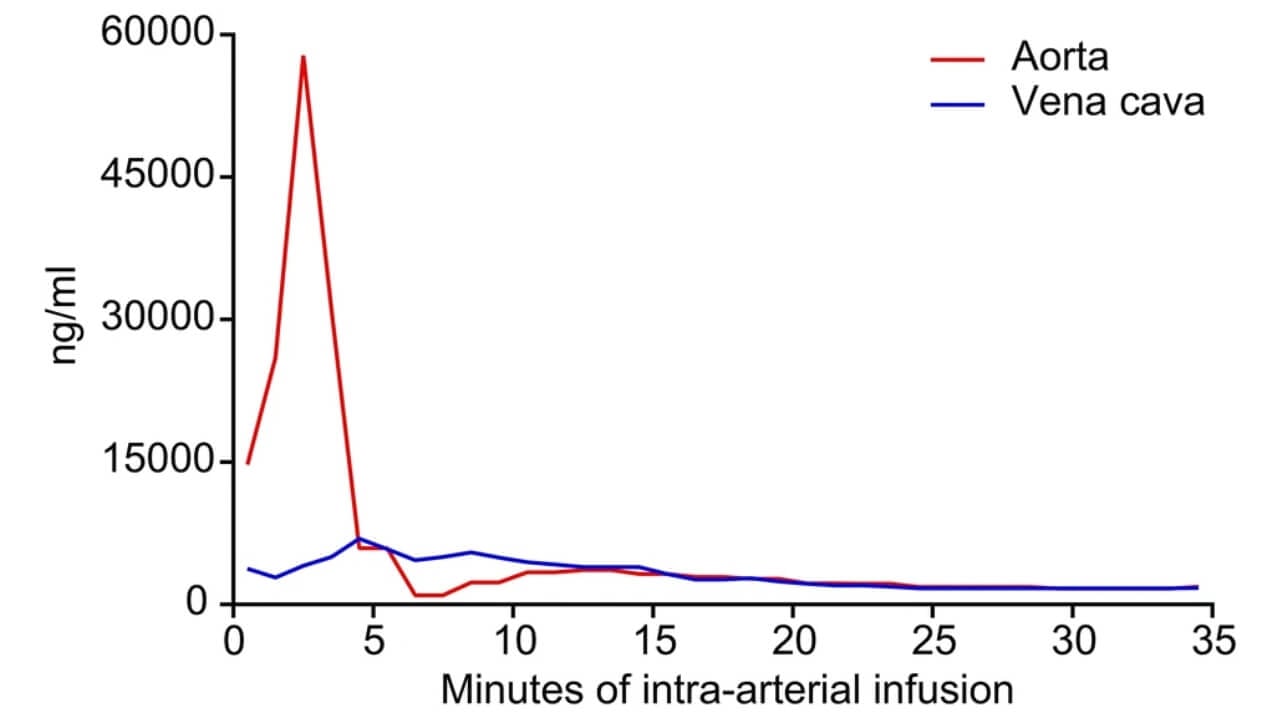
| الخصائص/نوع العلاج | معدل البقاء على قيد الحياة لمدة عامين | معدل الاستجابة | المدة | الآثار الجانبية |
|---|---|---|---|---|
| العلاج القياسي | ~٪25 للسرطان المتقدم | أقل من 10٪ | عدة دورات | شديدة (غثيان، وتعب، وتساقط الشعر، وكبت المناعة، وتهيُج الجلد) |
| الأساليب المبتكرة | ~٪60 للسرطان المتقدم | ٪65-45 | ما يصل إلى 4 جلسات | خفيفة (شعور موضعي بعدم الارتياح) |
تكاليف علاج سرطان البنكرياس
| طريقة العلاج | ألمانيا* | بريطانيا العظمى | الولايات المتحدة الأمريكية |
|---|---|---|---|
| العلاج القياسي | 80.000 € - 150.000 € دورة كاملة | 90.000 € - 165.000 € دورة كاملة | 100.000 € - 180.000 € دورة كاملة |
| الأساليب المبتكرة | 25.000 € - 60.000 € دورة كاملة | 70.000 € - 120.000 € دورة كاملة | 100.000 € - 150.000 € دورة كاملة |
* يمكن أن تختلف تكلفة كل علاج بشكلٍ كبير بناءً على عوامل مثل بلد العلاج، وسمعة المستشفى أو العيادة، وتعقيد الحالة، وطول مدة الإقامة في المستشفى، ورعاية المتابعة المطلوبة، وما إذا كان العلاج جزءاً من خطة علاج مُركبة أوسع. النفقات الإضافية، مثل التشخيص، والسفر، والإقامة، والرعاية الداعمة، قد تؤثر أيضاً على التكلفة الإجمالية.
قصص نجاح مرضى سرطان البنكرياس
غالباً ما تكون القصص الحقيقية أعلى صوتاً من الإحصائيات، كما أنها توفر الراحة للعائلات التي تواجه تشخيص الإصابة بسرطان البنكرياس. ومن بين هذه القصص قصة روبرت فرانكلين سميث، وهو مريض أمريكي لجأ إلى ألمانيا مع عائلته بحثاً عن أفضل علاج لسرطان البنكرياس.
بعد خضوعه للجراحة لعلاج نقائل الكبد الناجمة عن ورم البنكرياس، واصل السيد سميث العلاج الكيميائي الجهازي. ومع ذلك، لم تكن عائلته راضية عن القيود المفروضة على العلاج القياسي في الولايات المتحدة. أثناء بحثهم عن حلول أكثر تقدُماً، اكتشفوا خيارات العلاج البديل لسرطان البنكرياس المتاحة في ألمانيا، وخاصةً العلاج بالخلايا المتغصنة، وهو نهج مبتكر يقدمه الدكتور فرانك جانسوج في مختبرات LDG في بيرج.
بفضل الدعم المُقدم من شركة Booking Health، تمكنت عائلة سميث من تنظيم كل جانب من جوانب الرحلة العلاجية، بدءاً من تنسيق الوثائق الطبية ومواعيد العلاج، وصولاً إلى ترتيب الإقامة، وخدمات النقل من وإلى المطار، وتوفير مترجم خاص. شاركت السيدة سميث أنهم تأثروا بشدة بالمستوى المهني والاحترافي، والرعاية الشخصية، والدفء الذي تلقوه. وأشارت بشكلٍ خاص إلى أن الخبرة الطبية العميقة للدكتور جانسوج، إلى جانب نهجه الإنساني، التي جعلتهم يشعرون بالأمان والفهم طوال العملية.
منح العلاج بالخلايا المتغصنة السيد سميث أملاً. كمُكمل لبروتوكولات الأورام التقليدية، ساعد هذا العلاج المناعي الدقيق على استقرار حالته وتقليل خطر تكرار المرض، مع تجنُب السُمية العالية للعلاج الكيميائي التقليدي. ساهم العلاج أيضاً بشكل إيجابي في تحسين صحته العامة وجودة حياته.
بالنسبة لعائلات مثل عائلة سميث، تبرُز ألمانيا كأفضل دولة لعلاج سرطان البنكرياس، حيث تُقدم رعاية طبية متقدمة تجمع بين العلم، والابتكار، والرحمة. توضح تجربتهم كيف يمكن لعلاجات سرطان البنكرياس الجديدة أن تخلق إمكانيات حقيقية، حتى عندما يبدو الأمل بعيد المنال.
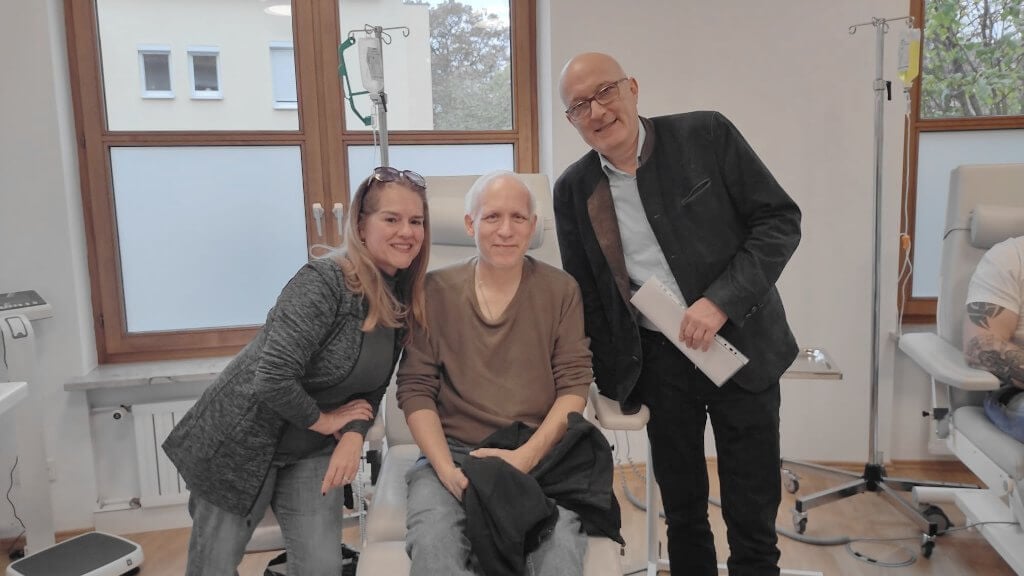
الرحلة الطبية: كل خطوة على الطريق مع Booking Health
يُعدّ إيجاد أفضل استراتيجية علاج لحالتك السريرية مهمةً صعبة. كونك مُنهكاً بالفعل من جلسات العلاج المتعددة، وبعد استشارة العديد من المتخصصين، وبعد تجربة العديد من التدخلات العلاجية، قد تضيع في جميع المعلومات التي يقدمها الأطباء لك. في مثل هذه الحالة، من السهل اختيار خيار مباشر أو اتباع بروتوكولات علاجية موحدة مع قائمة طويلة من الآثار الضارة بدلاً من اختيار خيارات علاجية مبتكرة ومتخصصة للغاية.
لاتخاذ قرار مستنير والحصول على خطة مُخصصة لإدارة السرطان، والتي سيتم تصميمها لتناسب حالتك السريرية المحددة، استشر الخبراء الطبيين في شركة Booking Health. نظراً لكونها في طليعة الشركات التي تُقدم أحدث الابتكارات الطبية لـ 12 عاماً بالفعل، تمتلك Booking Health خبرة قوية في إنشاء برامج معقدة لإدارة السرطان في كل حالة. كشركة مرموقة، تُقدم Booking Health خطط علاج مُخصصة للمرحلة الرابعة من سرطان البنكرياس في أفضل المستشفيات لعلاج سرطان البنكرياس، مع حجز مباشر للمستشفى ودعم كامل في كل مرحلة، بدءاً من العمليات التنظيمية ووصولاً إلى المساعدة أثناء العلاج. نحن نُقدم:
- تقييم وتحليل التقارير الطبية
- تطوير برنامج الرعاية الطبية
- اختيار أفضل مكان لعلاج سرطان البنكرياس
- إعداد الوثائق الطبية وإرسالها إلى مستشفى مناسب
- الاستشارات التحضيرية مع الأطباء لتطوير برامج الرعاية الطبية
- نصائح الخبراء أثناء الإقامة في المستشفى
- رعاية المتابعة بعد عودة المريض إلى بلده الأصلي بعد إكمال برنامج الرعاية الطبية
- الاهتمام بالإجراءات الرسمية كجزء من التحضير لبرنامج الرعاية الطبية
- تنسيق وتنظيم إقامة المريض في بلد أجنبي
- المساعدة في الحصول على التأشيرات وتذاكر الطيران
- مُنسق شخصي ومترجم فوري مع دعم 24/7
- الميزانية الشفافة بدون تكاليف خفية
الصحة جانبٌ لا يُقدّر بثمن في حياتنا. ينبغي تفويض إدارة شيء هش للغاية ولكنه ثمين إلى خبراء يتمتعون بخبرة مُثبتة وسمعة طيبة فقط. Booking Health هي شريك جدير بالثقة يساعدك في تحقيق صحة أقوى وجودة حياة أفضل. اتصل بمستشارنا الطبي لمعرفة المزيد حول إمكانيات العلاج الشخصي باستخدام أساليب مبتكرة لسرطان البنكرياس النقيلي مع المتخصصين الرائدين في هذا المجال.
علاج متقدم للسرطان: قصص نجاح المرضى مع Booking Health
الأسئلة الشائعة لمرضانا المصابين بسرطان البنكرياس
أرسل طلب للعلاجألقِ نظرة على العلاج المناعي بالخلايا المتغصنة و TACE (الانصمام الكيميائي عبر الشرايين) – فهذان هما العلاجان اللذان يمكن أن يكون لهما تأثيرات موجهة مع آثار جانبية أقل. يمكنك الاطلاع على القائمة الكاملة للخيارات المتاحة على موقع Booking Health.
غالباً ما يتم الجمع بين الجراحة (إن أمكن) وتقنيات الأشعة التداخلية، والعلاج الكيميائي، والعلاجات المبتكرة مثل العلاج المناعي – بحيث يمكن تحقيق أفضل نتيجة ممكنة بعد انتهاء دورة العلاج. وتُعد الخطة الطبية الشخصية الخيار الأكثر فعالية.
ينتشر بسرعة كبيرة بسبب الطبيعة العدوانية للمرض. من المهم تَجنُب التأجيل وبدء العلاج في أسرع وقتٍ ممكن في منشأة رعاية صحية متخصصة؛ بينما يمكنك دائماً الحصول على رأي ثانٍ في مكان آخر وتغيير اختيارك.
يعتبر العلاج الكيميائي أحد الأساليب الأساسية المُستخدمة في علاج سرطان البنكرياس Pancreatic cancer خاصةً في الحالات غير القابلة للجراحة أو الحالات النقيلية؛ أنظمة العلاج متعددة ويتم اختيارها بشكل فردي – من بين البروتوكولات المعتمدة. يمكن أن يُساعد ذلك في تقليص الأورام الأولية والنقيلية، وإدارة الأعراض والمظاهر المزعجة للسرطان.
لا يوجد علاج واحد فقط، وهذا أمر منطقي. الجراحة، والعلاج الكيميائي، والعلاج بالخلايا المتغصنة Dendritic cell therapy – لكل منها دورها وتوقيتها المناسب. تُعتبر الاستراتيجيات الشخصية مهمة، حيث أن لكل حالة سريرية خصوصياتها التي تتطلب اتخاذ إجراء، وأحياناً تتجاوز البروتوكول القياسي.
قد يحتاج المريض إلى إجراءات تبدأ من التدخل الجراحي وحتى تناول الأدوية. يشمل ذلك الجراحة (مثل إجراء ويبل Whipple procedure)، والعلاج الكيميائي، والعلاج الإشعاعي RT، والعلاج المناعي، والعلاج الموجه. تُسهم العلاجات المبتكرة في توسيع خيارات المرضى، يمكنك الاطلاع عليها على موقع Booking Health.
يُسهم الكشف في المرحلة المبكرة واتخاذ إجراء سريع في تحقيق نتائج علاجية أفضل. غالباً ما تتطلب المراحل المتقدمة المزيد من الخبرة، وخطط معقدة، وأساليب مبتكرة لإطالة العُمر. التوقعات فردية دائماً؛ ناقش الأمر مع مُقدم الرعاية الصحية الخاص بك – وإذا لزم الأمر، احصل على رأي ثانٍ في مراكز متخصصة في الخارج.
تُساعد Booking Health المرضى على إدارة نفقاتهم من خلال توفير تسعير شفاف والمساعدة في التفاوض مع المستشفيات وحلّ مشاكل التأمين الطبي. يمكن أن تتراوح التكاليف من 20.000 € للعلاج المناعي إلى أكثر من 150.000 € - للعلاج الكيميائي المُطول، وما إلى ذلك.
يعيش بعض المرضى عدة أشهر إلى سنوات. العلاجات الجديدة – العلاج المناعي بالخلايا المتغصنة وغيرها – تُساعد على إطالة متوسط العمر المتوقع، حتى في الحالات المتقدمة.
ما يُوصى به وتدعمه بيانات التجارب السريرية هو اتباع نظام غذائي متوازن بعناية، والحفاظ على النشاط البدني، وإدارة التوتر؛ ومن الرائع أيضاً تلقي الدعم العاطفي. لا تتردد في التواصل مع مجموعات الدعم ومجتمعات المرضى، فيمكن أن يكون ذلك مفيداً للغاية.
أولاً، ألقِ نظرة على مستشفى مايو كلينك، ومستشفى جونز هوبكنز (الولايات المتحدة الأمريكية)، ومستشفى جامعة آخن RWTH ومستشفى جامعة فرايبورغ، ومستشفى توبنغن الجامعي – جميعها تقع في ألمانيا. ستساعدك Booking Health في اختيار المستشفى المناسب.
المستشفيات المتصدرة في التصنيفات العالمية لديها أعلى معدلات للبقاء على قيد الحياة. مستشفى مايو كلينك، ومستشفى جونز هوبكنز، ومستشفى جامعة آخن RWTH ومستشفى جامعة فرايبورغ، ومستشفى توبنغن الجامعي تُسجل نتائج أفضل مقارنةً بالمستشفيات العامة.
إمكانية الوصول إلى فرق متعددة التخصصات، والخبرة في الجراحات المعقدة، وخطط العلاج الشخصية – كل ما يحتاجه المريض بشكل فردي.
بإمكان Booking Health المساعدة في ترتيب الحصول على رأي ثانٍ لتشخيص السرطان من مراكز سرطان البنكرياس الأعلى تصنيفاً في العالم. يجب استبعاد أي شكوك قبل بدء العلاج.
مستشفى مايو كلينك، ومستشفى جونز هوبكنز (الولايات المتحدة الأمريكية)، ومستشفى جامعة آخن RWTH ومستشفى جامعة فرايبورغ، ومستشفى توبنغن الجامعي – جميعها تقع في ألمانيا – وتستحق انتباه المرضى. لا تخف بسبب الموقع، فأبواب تلك المستشفيات مفتوحة للمرضى من جميع الدول.
بالتأكيد. تُقدم أفضل المراكز نهج رعاية شخصي للغاية. ويمكن للمرضى التأكد من أن كل خطة علاج ستكون مُصمَّمة خصيصاً لحالتهم.
نعم. مستشفى جامعة آخن RWTH ومستشفى جامعة فرايبورغ، ومستشفى توبنغن الجامعي؛ ومستشفى مايو كلينك، ومستشفى جونز هوبكنز (الولايات المتحدة الأمريكية). ستقوم Booking Health بترتيب موعد في أي من هذه المستشفيات.
نعم. فالعديد من أفضل مستشفيات سرطان البنكرياس توفر إمكانية الحصول على العلاج المناعي. تُعد هذه العلاجات عادةً جزءاً من برامج متقدمة – تهدف إلى تحسين نتائج المرضى المصابين بسرطان البنكرياس.
بالنسبة للمرحلة الرابعة من سرطان البنكرياس، يبلغ معدل البقاء على قيد الحياة لمدة عامين مع العلاج الكيميائي القياسي حوالي 25٪. ومن ناحية أخرى، فإن الأساليب العلاجية المبتكرة (مثل العلاج بالخلايا المتغصنة أو TACE أو الاجتثاث) يمكن أن تزيد معدل البقاء على قيد الحياة إلى حوالي 60٪.
ما هي معدلات الاستجابة التي يتم تحقيقها في المرحلة الرابعة من سرطان البنكرياس باستخدام العلاجات المبتكرة (مثل العلاج بالخلايا المتغصنة و TACE والاجتثاث)؟
في المرحلة 4 من سرطان البنكرياس، يُحقق العلاج الكيميائي القياسي معدل استجابة أقل من 10٪. في المقابل، فإن الأساليب العلاجية المبتكرة، مثل العلاج بالخلايا المتغصنة، والعلاج الكيميائي الكهربائي Electrochemotherapy والاجتثاث الحراري، يمكن أن تُحقق معدلات استجابة تصل إلى 45-65٪.
غالباً ما يتطلب العلاج الكيميائي القياسي للمرحلة الرابعة من سرطان البنكرياس عدة دورات علاجية على مدى عدة أشهر. في المقابل، فالعلاجات المبتكرة (مثل TACE أو الاجتثاث أو العلاج بالخلايا المتغصنة) يتم استكمالها عادةً في ما يصل إلى أربع جلسات.
غالباً ما تُسبب العلاجات القياسية للمرحلة 4 من سرطان البنكرياس آثاراً جانبية شديدة، تشمل التعب، والغثيان، وكبت المناعة. ومع ذلك، فإن العلاجات المبتكرة (مثل TACE أو الاجتثاث بالتبريد، أو العلاج بالخلايا المتغصنة) عادةً ما تُسبب فقط شعور خفيف وموضعي بعدم الارتياح.
يعتمد اختيار العلاج في سرطان البنكرياس على مرحلة المرض، وقابلية الاستئصال، والحالة الصحية العامة للمريض. تشمل الأساليب العلاجية القياسية – الجراحة، والعلاج الجهازي، والعلاج الإشعاعي (عند الإشارة إليه). تُستخدم الأشعة التداخلية للسيطرة الموضعية على الورم أو إدارة المضاعفات المرتبطة بالورم؛ قد يتم اعتبار العلاج بالخلايا المتغصنة استراتيجية مناعية مُساعدة.
من منظور سريري، توفر ألمانيا إمكانية الوصول إلى العلاجات القياسية لسرطان البنكرياس وخيارات العلاج الموسعة. يمكن دمج إجراءات الأشعة التداخلية والعلاج بالخلايا المتغصنة في خطط علاج فردية ضمن بيئات طبية مُنظمة – وهو أمر ذو أهمية للمرضى الذين يحتاجون إلى أساليب تتجاوز المبادئ التوجيهية التقليدية.
اختر العلاج في الخارج وستحصل بالتأكيد على أفضل النتائج!
المؤلفون:
تم تحرير المقال من قبل خبراء طبيين وأطباء معتمدين من مجلس الأطباء الدكتورة ناديجدا إيفانيسوفا و الدكتور بوغدان ميخالنيوك. لعلاج الحالات المشار إليها في المقال، يجب استشارة الطبيب؛ المعلومات الواردة في المقالة ليست مخصصة للتطبيب الذاتي!
سياستنا التحريرية، التي توضح بالتفصيل التزامنا بالدقة والشفافية، متاحة هنا. انقر على هذا الرابط لمراجعة سياساتنا.
المصادر:
World Journal of Gastroenterology
اقرأ:
العلاجات الحديثة لسرطان البنكرياس
تقدم ألمانيا علاج مناعي قائم على الخلايا المتغصنة لسرطان البنكرياس


